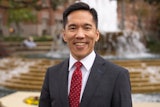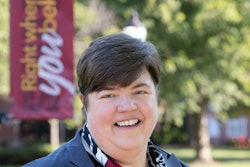African American earth scientists ponder strategies to attract more students of color to a field with growing opportunities
Reston, Va. — Their work is essential to the production and
preservation of things we take for granted every day — resources like
water, natural gas, and petroleum. Yet, if you asked the average person
what geoscientists do, most would be stumped.
And if you asked the average geoscientist why so few among them are African American, the reaction wouldn’t be much different.
Last month, a group of roughly fifty African American geologists,
geophysicists, students, and corporate recruiters convened here on the
campus of the U.S. Geological Survey (USGS) to discuss the future of
their profession and strategies for expanding their numbers. The theme
of the seventeenth annual conference of the National Association of
Black Geologists and Geophysicists (NABGG) was “Diversity in
Geoscience.”
“Within five years, approximately 25 percent of our current staff
will be eligible for retirement,” said Cynthia L. Quarterman, director
of the U.S. Department of the Interior’s Minerals Management Service, a
major federal employer of geoscientists.
“MMS has a five-point strategic plan for diversity,” Quarterman adds.
Noting that five different world records for offshore resource
production were set on the outer continental shelf in the Gulf of
Mexico in the past year, she said that resource production is expected
to double there in coming years.
But unless the production of students of color in these fields
expands similarly at the nation’s colleges and universities, hopes of
filling these career slots with U.S.-born geoscientists will fall far
below expectations.
“One major problem is the lack of people who are trained to do this work,” Quarterman said.
In 1980, according to Quarterman, the nation’s colleges and
universities produced 425 petroleum engineers and 253 geoscientists. By
1997, they produced only 162 petroleum engineers and 158 geoscientists.
For its part, the MMS has established cooperative agreements with
six historically Black colleges and universities in an effort to expose
more African American students to career opportunities in the
geosciences. The schools involved include Elizabeth City State,
Dillard, Jackson State, and Langston universities, and Bethune-Cookman
and St. Augustine’s colleges.
Attracting Interest
One reason so few African Americans are drawn to the field is that,
“Geoscience isn’t a household word,” said Dr. Isaac “Ike” J. Crumbley,
dean of the School of Arts and Sciences at Fort Valley State College,
in Georgia. To combat this problem, his college sponsors a summer
program that introduces students of color to the field as early as the
eighth grade. Geology is a core part of the Fort Valley Mathematics,
Science, and Engineering Academy (MSEA), which attracts middle and high
school students from around the country.
Fort Valley also offers a cooperative bachelor’s degree program in
geology with the University of Oklahoma. Students usually spend three
years at Fort Valley studying mathematics and geology, and two
additional years in geology at Oklahoma.
Lack of early exposure to geoscience, the scarcity of earth science
programs at historically Black institutions, low teacher expectations,
and overall poor math and science preparation were cited as persistent
deterrents to African American success — or even interest — in the
field.
“Most people have the impression that there are few opportunities
in the sciences, geosciences in particular,” said Dr. Marilyn Suitor,
director of human resources and career development at the American
Geological Institute.
Suitor also said that while there are several existing strategies
to entice students of color to consider careers in geoscience, “these
programs are not enough.”
“We must not only think in terms of pipeline issues,” said Dr.
Norman Fortenberry, of the National Science Foundation’s Educating for
Diversity project.
Teacher preparation and textbook development are among other issues
that must be addressed, he said, because of the strong role they play
in student decisions and preparation.
One of the programs the National Science Foundation has launched in
hopes of addressing these concerns is the Classroom Curriculum
Laboratory Integration program. It awards grants of up to $300,000 to
institutions that focus research, projects, or programs on these issues.
Short Supply of Geoscience Faculty
While he shares his colleagues’ concerns about the scarcity of
African American geoscientists in the private sector and in government,
Dr. Frank Hall is most concerned about their near absence in the
faculty ranks of higher education.
A former Ford Foundation fellow, Hall was one of only three African
American science faculty at the University of Delaware for several
years. Now in his first semester at the University of New Orleans, he
says one of the biggest obstacles to increasing the number of Black
faculty is that the geosciences are not valued by the Black community,
even among African American scholars.
“I can remember people saying to me while I was in school, `You
shouldn’t be doing this,'” said the professor who earned his
undergraduate degree in geology and oceanography at Kean University,
and completed his doctoral work in oceanography at the University of
Rhode Island in 1991.
Since most African American scholars are concentrated in the social
sciences, in cultural terms, Hall finds being a Black science professor
a lonely existence.
“If you’re not in a field where you are directly [perceived as]
helping the Black community, you’re ignored. It’s like being a minority
within a minority,” he said.
Yet Hall believes growing the ranks of Black geoscience faculty is
critical to expanding the overall African American presence in the
profession.
Presentations and Reflection
The annual NABGG conference not only was an opportunity for
attendees to brainstorm about recruitment and retention issues, it also
provided an opportunity for members to make formal and informal
presentations about their work.
During his presentation, luncheon speaker Dr. Charles Brown, of the
USGS and International Geological Engineering Research Institute,
illustrated how geoscience offers numerous opportunities to travel and
work abroad. His work has carried him to various parts of Africa and
Latin America.
Other presenters included: Dr. Kristie King, who discussed the
plethora of opportunities for geoscientists in environmental science;
NABGG student chapter president Daniel Samake, who presented his work
at the University of Oklahoma on Stochastic Fluid Substitution; and Dr.
Wes Ward, who offered a geological view of Mars, using photos sent back
via satellite last year during the pioneering Pathfinder mission.
Dr. Randolph Wilson Bromery, the senior statesman at the conference
reflected on how far the profession has come since he entered it in
1948. In the early days, legend has it, you could fit all of the
nation’s Black geoscientists into a Volkswagen. Today, NABGG has an
estimated 300 members.
Still, Bromery said, African American geoscientists are in a precarious position.
“If we push too hard, we may do more harm than good,” he said,
betraying a concern that by drawing too much attention to their
scarcity Black geoscientists may actually hinder recruitment efforts.
“But the fact is, the more African American geoscientists there are,
the more you’ll get.”
COPYRIGHT 1998 Cox, Matthews & Associates
© Copyright 2005 by DiverseEducation.com















